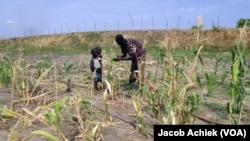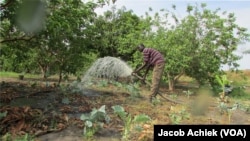When Paul Alim Amuol planted the first seedlings on a plot of land in Bor in 2007, he did not imagine that his modest undertaking would blossom into a 4.5-hectare farm with 800 fruit trees and a variety of vegetables that are in demand as far away as Juba.
The local community buys many of his crops, but his farm is so productive that Amuol grows far more than the residents of Bor can consume. And that poses a problem for him, because Amuol has neither the means to refrigerate his crops, nor the transport to take it to other markets like Juba, around 200 kilometers south of Bor.
"People want my guava in Juba and they don’t get it because I cannot take it to Juba while I have no small pick-up. So we just lost these fruits... they get rotten very quickly," he says.
Amuol's surplus crops also pose a sad irony, because not far from Bor, tens of thousands of displaced people in Panyijar County, in Unity state, are living off 4 kilograms per person, per month of food rations from the World Food Program (WFP). Because of insecurity and the imminent onset of the rainy season, aid agencies are having difficulty getting long-shelf-life foods like sorghum to the displaced. Transporting fresh fruit and vegetables would be an even more difficult task.
Fresh fruit in abundance
A former environmental director at the Jonglei state Ministry of Physical Infrastructure, Aluom made the leap to farming with funds from Norwegian People’s Aid and the World Bank. The two organizations were running an initiative to replant trees that were being cut down to make way for infrastructure projects. Amuol decided he would plant fruit trees to try to simultaneously improve the finances of Jonglei state and fight deforestation.
His first trees were mango and guava trees. Today, he also grows tomatoes, cabbage, kale, Maize, okra and onions, has started to keep honeybees, and is planning to plant sugar cane and banana trees.
Amuol is looking for partners to help him out of the predicament of having a productive farm but no way to keep his fruit and vegetables fresh or get them to markets beyond Bor.
"What I need... those who will come and have their fridge around, and take mango when it is excessive, take guava when it is excessive," he says. He is also looking for truck and car drivers to take his excess fruit to other cities.
Amuol faces other challenges, as well, including how best to irrigate his farm, and how to pump out excess water during the rainy season.
“I have about 10 water pump generators, which I use for watering the garden, the vegetables like kale, tomato, eggplant and okra," he says. "They need water everyday, so I use the water pump generator to pump water in, and when water is excessive, I use the generators to pump water out."
Amuol is on the horns of a dilemma. He says that if he had more knowledge and tools, he would be able to improve his farming techniques and increase his farm's productivity. But if improved farming methods help Amuol produce more crops, he will face an even bigger problem of preserving his crops or getting them to market quickly.






